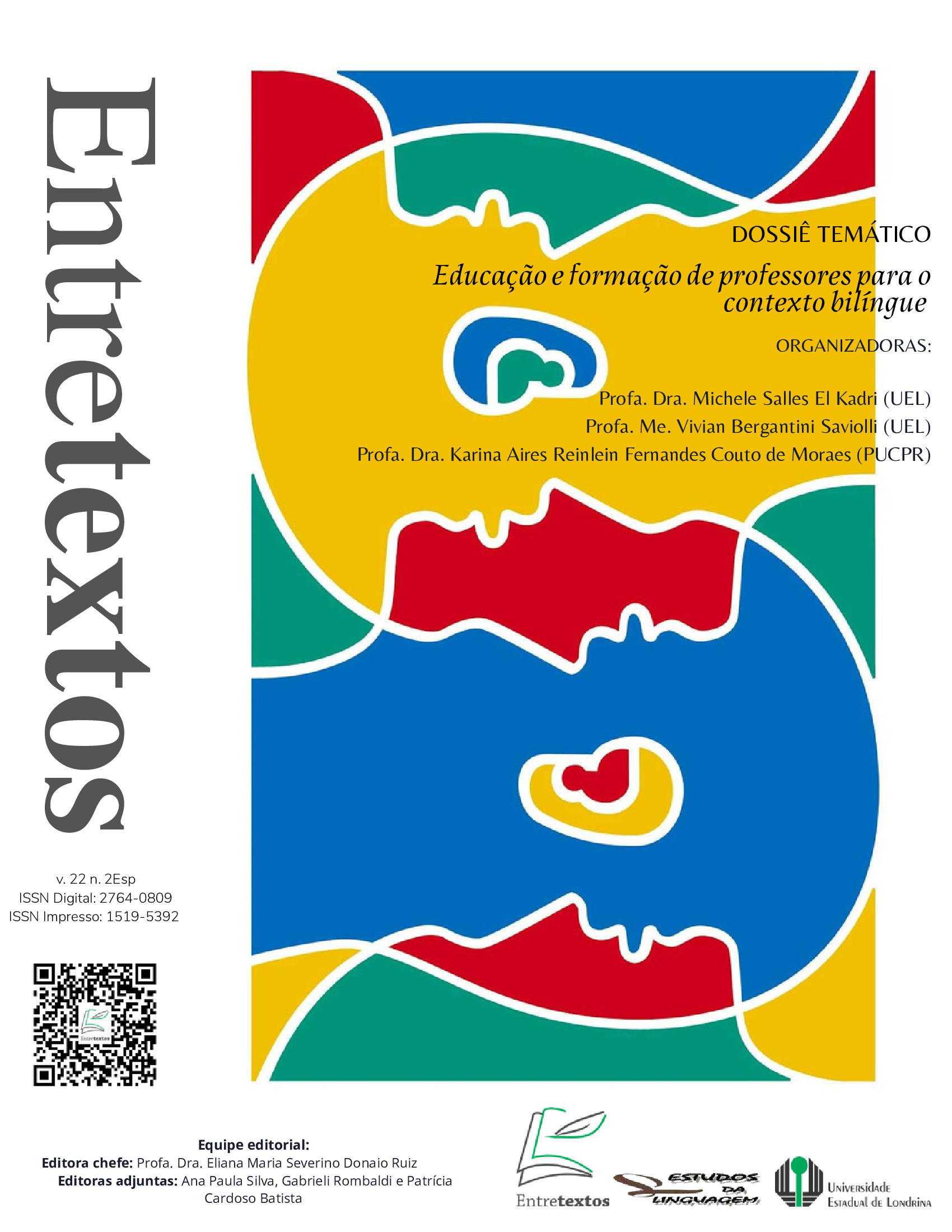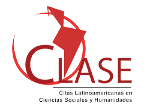Beliefs of bilingual education teachers related to students who are speakers of german as a mother tongue
DOI:
https://doi.org/10.5433/1519-5392.2022v22n2Esp.p04Keywords:
Bilingualism, Beliefs, Teacher educationAbstract
There are several factors that may interfere with an effective teaching-learning process of bilingual students from linguistic minority communities in Brazil - whether they are related to the lack of adequate preparation offered to teachers or to hegemonic perspectives regarding these minorities. Therefore, this article aims to identify the beliefs of teachers in a bilingual context and their implications in the education of students who speak German as their mother tongue. To that end, a literature review of studies in the area was carried out, as well as considerations about possibilities for bilingual and multilingual classrooms, based on Fritzen (2007), Graves (2000), Liberali and Swanwick (2020), among others. A survey instrument was designed and sent to teachers inserted in the scope of this study. Finally, the results are examined, which present the beliefs of the participants, and analyzed in relation to the exposed theory. The result exposed that misconceptions are still perpetuated about the learning of bilingual students, as well as some resistance to bilingual practices in the classroom, which points to teaching strategies consistent with this vision.
Downloads
References
BARCELOS, A. M. F. Crenças sobre aprendizagem de línguas, lingüística aplicada e ensino de línguas. Revista Linguagem & Ensino, Pelotas, v. 7, n. 1, p. 123-156, 2004. Disponível em: https://periodicos.ufpel.edu.br/ojs2/index.php/rle/article/view/15586. Acesso em: 26 maio 2021.
BARCELOS, A. M. F. Metodologia de pesquisa das crenças sobre aprendizagem de línguas: estado da arte. Revista Brasileira de Linguística Aplicada, Belo Horizonte, v. 1, n. 1, p. 71-92, 2001. Disponível em: https://www.scielo.br/j/rbla/a/dXSRMGdSDkTzWwQHhktLQyC/?lang=pt. Acesso em: 26
COYLE, D.; HOOD, P.; MARSH, D. CLIL: content and language integrated learning. Cambridge: Cambridge University Press, 2010.
CUNHA, L. M. A. da. Modelos Rasch e Escalas de Likert e Thurstone na medição de atitudes. 2007. 78 f. Dissertação (Mestrado em Probabilidades e Estatística) - Universidade de Lisboa, Lisboa, 2007. Disponível em: http://hdl.handle.net/10451/1229. Acesso em: 2 jun. 2021.
FERNANDES, K. Desafios das IES na formação de professores bilíngues. Ensino Superior, São Paulo, set. 2021. Disponível em: https://revistaensinosuperior.com.br/formacao-professores-bilingues/. Acesso em: 20 out. 2021.
FRITZEN, M. P. Ich kann mein Name mit letra junta und letra solta Schreiben: bilingüismo e letramento em uma escola rural localizada em zona de imigração alemã no Sul do Brasil. 2007. 289 f. Tese (Doutorado) - Universidade Estadual de Campinas, Campinas, 2007. Disponível em: https://bdtd.ibict.br/vufind/Record/CAMP_bf781fdda1e67011dbb8da0b3b7e0660. Acesso em: 1 jun. 2021.
GARCÍA, O.; WEI, L. Language, bilingualism and education. In: GARCÍA, O.; WEI, L. Translanguaging: Language, Bilingualism and Education. Palgrave Pivot, Londres, 2014. cap. 3, p. 46-62.
GRAVES, K. Designing language courses: a guide for teachers. Boston: Heinle & Heinle, 2000. Disponível em: http://docshare01.docshare.tips/files/26646/266463646.pdf. Acesso em: 7 jun. 2021.
GRILLI, M. CLIL em alemão no Brasil e a competência de leitura dos graduandos em Letras/Alemão. Pandaemonium Germanicum, São Paulo, v. 22, n. 38, p. 48-74, 2019. Disponível em: https://doi.org/10.11606/1982-8837223848. Acesso em: 14 jun. 2021.
LIBERALI, F.; SWANWICK, R. Translanguaging as a tool for decolonizing interactions in a space for confronting inequalities. DELTA: Documentação de estudos em lingüística teórica e aplicada, São Paulo, v. 36, n. 3, p. 1-26, 2020. Disponível em: https://doi.org/10.1590/1678-460X2020360303. Acesso em: 2 jun. 2021.
LUCENA, M. I. P.; CARDOSO, A. C. Translinguagem como recurso pedagógico: uma discussão etnográfica sobre práticas de linguagem em uma escola bilíngue. Calidoscópio, São Leopoldo, v. 16, n. 1, p. 143-151, 2018. Disponível em: https://doi.org/10.4013/cld.2018.161.13. Acesso em: 25 maio 2021.
MICHELI, L. Formação de professores para contextos de educação bilíngue: uma reflexão a partir das crenças de alunos-professores do curso de Letras sobre o bilinguismo. 2020. 218 f. Dissertação (Mestrado em Letras) - Universidade Federal do Paraná, Curitiba, 2020. Disponível em: https://hdl.handle.net/1884/68283. Acesso em: 28 maio 2021.
OTHEGUY, R.; GARCÍA, O.; REID, Wallis. Clarifying translanguaging and deconstructing named languages: A perspective from linguistics. Applied Linguistics Review, [s. l.], v. 6, n. 3, p. 281-307, 2015. Disponível em: https://doi.org/10.1515/APPLIREV-2015-0014. Acesso em: 2 jun. 2021.
PAJARES, M. F. Teachers' Beliefs and educational research: cleaning up a messy construct. Review of Educational Research, Washington, v. 62, n. 3, p. 307-332, 1992. Disponível em: https://doi.org/10.3102/00346543062003307. Acesso em: 14 jun. 2021.
SILVA, K. A. da. Crenças sobre o ensino e aprendizagem de línguas na Lingüística Aplicada: um panorama histórico dos estudos realizados no contexto brasileiro. Revista Linguagem & Ensino, Pelotas, v. 10, n. 1, p. 235-271, 2007. Disponível em: https://periodicos.ufpel.edu.br/ojs2/index.php/rle/article/view/15657. Acesso em: 26 maio 2021.
VOIGT, A. F. O teuto-brasileiro: a história de um conceito. Espaço Plural, Marechal Cândido Rondon, v. 9, n. 19, p. 75-81, 2008. Disponível em: http://e-revista.unioeste.br/index.php/espacoplural/article/view/1930. Acesso em: 31 maio 2021.
WOLFFOWITZ-SANCHEZ, N. Formação de professores para a educação infantil bilíngue. 2009. 229 f. Dissertação (Mestrado em Linguística Aplicada e Estudos da Linguagem) - Pontifícia Universidade Católica de São Paulo, São Paulo, 2009. Disponível em: https://repositorio.pucsp.br/jspui/handle/handle/14087. Acesso em: 8 jun. 2021.
WOLSCHICK, I. Aspectos do bilinguismo alemão-português nas comunidades de Mondaí e São João do Oeste - sc. 2016. 133 f. Dissertação (Mestrado em Estudos Linguísticos) - Universidade Federal da Fronteira Sul, Chapecó, 2016. Disponível em: https://rd.uffs.edu.br/handle/prefix/760. Acesso em: 31 maio 2021.
Downloads
Published
How to Cite
Issue
Section
License
Copyright (c) 2022 Entretextos

This work is licensed under a Creative Commons Attribution 4.0 International License.
Entretextos adota a Licença Creative Commons Attribution 4.0 International, portanto, os direitos autorais relativos aos artigos publicados são do/s autor/es.
Sob essa licença é possível: Compartilhar - copiar e redistribuir o material em qualquer suporte ou formato. Adaptar - remixar, transformar, e criar a partir do material, atribuindo o devido crédito e prover um link para a licença e indicar se mudanças foram feitas.
























